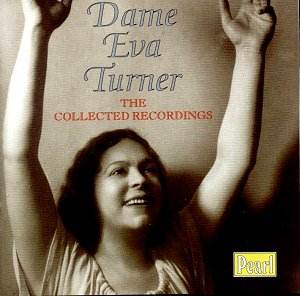It’s one of the more regrettable features of
the inter-War 78 catalogue that Eva Turner, the most seismic vocal
force in British operatic life, was an almost invisible, or more
properly inaudible, name. In her earliest discs, made in Italy,
she recorded concerted selections alongside such native stalwarts
as Rubadi, Ciniselli, Paci and Carmassi but her greatest fame
resides in the solo arias she recorded, principally with Beecham,
and in the live Covent Garden 1937 extracts. Because of the paucity
of this surviving material there is a great deal of duplication
here – and a look at the head note will reveal multiple performances
of certain items. Certainly Columbia thought well enough of her
to re-record some of the September 1926 Italian sides – which
incidentally she stoutly denied ever having made – a couple of
years later in London. There are also some popular parlour ballads
here – D’Hardelot, Ronald and Tosti – as well as some exciting,
unpublished Columbias and these include Wagner, some Puccini and
infinitely less likely - but true - a surviving fragment of a
Bantock song. A corollary to the sheer bulk of repetition is that
the sound is generally good and rises to a peak of excellence
in the BBC Regional programme excerpt from November 1937 which
was saved from the skip by annotator Richard Bebb, whose account
of a BBC chuck out of similarly unique acetates of broadcasts
makes the grimmest of reading. To round off the set, itself indicative
of the small body of her recordings, is Vaughan Williams’ Serenade
to Music. She did record after this, in 1942 especially, but these
discs were never issued and showed the voice in decline. Bebb
has accordingly, respecting her own wishes, refrained from including
them in this otherwise most comprehensive and impressive collection.
Turner’s vibrant power is unleashed on most of
these discs. She can scintillate but she can move as well, though
not invariably. Vissi d’arte is a special disc – the earlier Italian
performance is good but the Beecham-accompanied London remake
two years later is remarkable. In these 1928 sessions she is at
something like her early peak; the voice has matured from the
striking but occasionally overused instrument in the Italian Columbia
studios. She is now coiled and steeled with dramatic intensity;
this was always a voice that stretched recording mechanisms to
the limit but now there is an extra layer of subtlety to it. She
projects better – the top F sharp in the Turandot extract is shot
out with unstoppable intensity. And when one moves to the 1937
live Covent Garden extracts one can finally and fully appreciate
her in congenial repertoire unfettered by the artificial constraints
of the recording studio or microphone. When she turned to the
lighter repertoire she reveals obvious limitations. This battleship
voice was hardly suited to the dandelion charm of Landon Ronald’s
O lovely night, much less D’Hardelot (Italian, orchestrally accompanied
discs from 1926) and in Grieg there is rather too much of the
redoubtable matron about her delivery.
No, this was an operatic voice and one can appreciate
its development from the issued performances Suicidio from La
Gioconda – both excellent, the second and slightly later recording
evinces just that bit more dramatic continuity and subtle drama.
The Regional programme is in remarkable aural shape even if the
performances of Turner and her partner Dino Borgioli in Madama
Butterfly, La Bohème and Turandot are a little way off
the highest standards of her very best incarnations. And above
all there is the Coronation Season Barbirolli-conducted Turandot
where all are eviscerated by Turner’s convulsively dramatic singing.
Martinelli may be uneven – even if marvellously so – and the chorus
and orchestra do become separated at times but the sense of visceral
engagement Turner here generates is quite enough to promote her
to the front rank of dramatic sopranos.
This three-disc set is all one would wish for.
Despite broken 78s and some worn test pressings Roger Beardsley
has done an award-winning job on the sound and the booklet is
attractive as well as historically informed.
Jonathan Woolf


